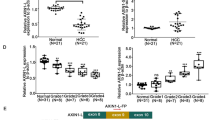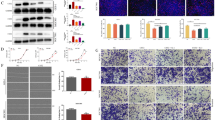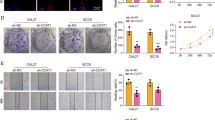Abstract
Ribosomal protein S3 (RPS3) is a component of the 40S ribosomal subunit. It is known to function in ribosome biogenesis and as an endonuclease. RPS3 has been shown to be over expressed in colon adenocarcinoma but its role in colon cancer is still unknown. In this study, we aim at determining the expression levels of RPS3 in a colon cancer cell line Caco-2 compared to a normal colon mucosa cell line NCM-460 and study the effects of targeting this protein by siRNA on cellular behavior. RPS3 was found to be expressed in both cell lines. However, siRNA treatment showed a more protruding effect on Caco-2 cells compared to NCM-460 cells. RPS3 knockdown led to a significant decrease in the proliferation, survival, migration and invasion and an increase in the apoptosis of Caco-2 cells. Western blot analysis demonstrated that these effects correlated with an increase in the level of the tumor suppressor p53 and a decrease in the level and activity of lactate dehydrogenase (LDH), an enzyme involved in the metabolism of cancer cells. No significant effect was shown in normal colon NCM-460 cells. Targeting p53 by siRNA did not affect RPS3 levels indicating that p53 may be a downstream target of RPS3. However, the concurrent knockdown of RPS3 and p53 showed no change in LDH level in Caco-2 cells suggesting an interesting interplay among the three proteins. These findings might present RPS3 as a selective molecular marker in colon cancer and an attractive target for colon cancer therapy.




Similar content being viewed by others
References
Henras AK, Soudet J, Gerus M, Lebaron S, Caizergues-Ferrer M, Mougin A, Henry Y (2008) The post-transcriptional steps of eukaryotic ribosome biogenesis. Cell Mol Life Sci 65(15):2334–2359. https://doi.org/10.1007/s00018-008-8027-0
Kim J, Chubatsu LS, Admon A, Stahl J, Fellous R, Linn S (1995) Implication of mammalian ribosomal protein S3 in the processing of DNA damage. J Biol Chem 270(23):13620–13629
Zhou X, Liao WJ, Liao JM, Liao P, Lu H (2015) Ribosomal proteins: functions beyond the ribosome. J Mol Cell Biol 7(2):92–104. https://doi.org/10.1093/jmcb/mjv014
Yadavilli S, Mayo LD, Higgins M, Lain S, Hegde V, Deutsch WA (2009) Ribosomal protein S3: a multi-functional protein that interacts with both p53 and MDM2 through its KH domain. DNA Repair 8(10):1215–1224. https://doi.org/10.1016/j.dnarep.2009.07.003
Kim HD, Kim TS, Kim J (2011) Aberrant ribosome biogenesis activates c-Myc and ASK1 pathways resulting in p53-dependent G1 arrest. Oncogene 30(30):3317–3327. https://doi.org/10.1038/onc.2011.47
Pogue-Geile K, Geiser JR, Shu M, Miller C, Wool IG, Meisler AI, Pipas JM (1991) Ribosomal protein genes are overexpressed in colorectal cancer: isolation of a cDNA clone encoding the human S3 ribosomal protein. Mol Cell Biol 11(8):3842–3849
Boyle P, Ferlay J (2005) Mortality and survival in breast and colorectal cancer. Nat Clin Pract Oncol 2(9):424–425. https://doi.org/10.1038/ncponc0288
International Agency for Research on Cancer Washington (2002) World Health Organization cancer incidence in five continents. The World Health Organization and the International Agency for Research on Cancer, Lyon
World Cancer Research Fund (2007) Food, Nutrition, Physical Activity, and the Prevention of Cancer: A Global Perspective. American Institute for Cancer Research, Washington
De Rosa M, Pace U, Rega D, Costabile V, Duraturo F, Izzo P, Delrio P (2015) Genetics, diagnosis and management of colorectal cancer (Review). Oncol Rep 34(3):1087–1096. https://doi.org/10.3892/or.2015.4108
DeBerardinis RJ, Lum JJ, Hatzivassiliou G, Thompson CB (2008) The biology of cancer: metabolic reprogramming fuels cell growth and proliferation. Cell Metab 7(1):11–20. https://doi.org/10.1016/j.cmet.2007.10.002
Icard P, Shulman S, Farhat D, Steyaert JM, Alifano M, Lincet H (2018) How the Warburg effect supports aggressiveness and drug resistance of cancer cells? Drug Resist Updat 38:1–11. https://doi.org/10.1016/j.drup.2018.03.001
Hsu PP, Sabatini DM (2008) Cancer cell metabolism: Warburg and beyond. Cell 134(5):703–707. https://doi.org/10.1016/j.cell.2008.08.021
Rajeshkumar NV, Dutta P, Yabuuchi S, de Wilde RF, Martinez GV, Le A, Kamphorst JJ, Rabinowitz JD, Jain SK, Hidalgo M, Dang CV, Gillies RJ, Maitra A (2015) Therapeutic targeting of the Warburg effect in pancreatic cancer relies on an absence of p53 function. Cancer Res 75(16):3355–3364. https://doi.org/10.1158/0008-5472.CAN-15-0108
Allison SJ, Knight JR, Granchi C, Rani R, Minutolo F, Milner J, Phillips RM (2014) Identification of LDH-A as a therapeutic target for cancer cell killing via (i) p53/NAD(H)-dependent and (ii) p53-independent pathways. Oncogenesis 3:e102. https://doi.org/10.1038/oncsis.2014.16
Ishiguro T, Nakajima M, Naito M, Muto T, Tsuruo T (1996) Identification of genes differentially expressed in B16 murine melanoma sublines with different metastatic potentials. Cancer Res 56(4):875–879
Shuda M, Kondoh N, Tanaka K, Ryo A, Wakatsuki T, Hada A, Goseki N, Igari T, Hatsuse K, Aihara T, Horiuchi S, Shichita M, Yamamoto N, Yamamoto M (2000) Enhanced expression of translation factor mRNAs in hepatocellular carcinoma. Anticancer Res 20(4):2489–2494
Tian Y, Qin L, Qiu H, Shi D, Sun R, Li W, Liu T, Wang J, Xu T, Guo W, Kang T, Huang W, Wang G, Deng W (2015) RPS3 regulates melanoma cell growth and apoptosis by targeting Cyto C/Ca2+/MICU1 dependent mitochondrial signaling. Oncotarget 6(30):29614–29625. https://doi.org/10.18632/oncotarget.4868
Hua W, Yue L, Dingbo S (2016) Over-expression of RPS3 promotes acute lymphoblastic leukemia growth and progress by down-regulating COX-2 through NF-κb pathway. Blood 128(22):3927
Zhao L, Cao J, Hu K, Wang P, Li G, He X, Tong T, Han L (2018) RNA-binding protein RPS3 contributes to hepatocarcinogenesis by post-transcriptionally up-regulating SIRT1. Nucleic Acids Res. https://doi.org/10.1093/nar/gky1209
Naora H, Takai I, Adachi M, Naora H (1998) Altered cellular responses by varying expression of a ribosomal protein gene: sequential coordination of enhancement and suppression of ribosomal protein S3a gene expression induces apoptosis. J Cell Biol 141(3):741–753
Kim W, Youn H, Lee S, Kim E, Kim D, Sub Lee J, Lee JM, Youn B (2018) RNF138-mediated ubiquitination of rpS3 is required for resistance of glioblastoma cells to radiation-induced apoptosis. Exp Mol Med 50(1):e434. https://doi.org/10.1038/emm.2017.247
Nagao-Kitamoto H, Setoguchi T, Kitamoto S, Nakamura S, Tsuru A, Nagata M, Nagano S, Ishidou Y, Yokouchi M, Kitajima S, Yoshioka T, Maeda S, Yonezawa S, Komiya S (2015) Ribosomal protein S3 regulates GLI2-mediated osteosarcoma invasion. Cancer Lett 356:855–861. https://doi.org/10.1016/j.canlet.2014.10.042
Kim SH, Kim J (2006) Reduction of invasion in human fibrosarcoma cells by ribosomal protein S3 in conjunction with Nm23-H1 and ERK. Biochim Biophys Acta 1763(8):823–832. https://doi.org/10.1016/j.bbamcr.2006.03.011
Momand J, Wu HH, Dasgupta G (2000) MDM2—master regulator of the p53 tumor suppressor protein. Gene 242(1–2):15–29
Liu Y, Bodmer WF (2006) Analysis of P53 mutations and their expression in 56 colorectal cancer cell lines. Proc Natl Acad Sci USA 103(4):976–981. https://doi.org/10.1073/pnas.0510146103
Kim H, Kokkotou E, Na X, Rhee SH, Moyer MP, Pothoulakis C, Lamont JT (2005) Clostridium difficile toxin A-induced colonocyte apoptosis involves p53-dependent p21(WAF1/CIP1) induction via p38 mitogen-activated protein kinase. Gastroenterology 129(6):1875–1888. https://doi.org/10.1053/j.gastro.2005.09.011
Vousden KH, Ryan KM (2009) p53 and metabolism. Nat Rev Cancer 9(10):691–700. https://doi.org/10.1038/nrc2715
Simabuco FM, Morale MG, Pavan ICB, Morelli AP, Silva FR, Tamura RE (2018) p53 and metabolism: from mechanism to therapeutics. Oncotarget 9(34):23780–23823. https://doi.org/10.18632/oncotarget.25267
Fantin VR, St-Pierre J, Leder P (2006) Attenuation of LDH-A expression uncovers a link between glycolysis, mitochondrial physiology, and tumor maintenance. Cancer Cell 9(6):425–434. https://doi.org/10.1016/j.ccr.2006.04.023
Le A, Cooper CR, Gouw AM, Dinavahi R, Maitra A, Deck LM, Royer RE, Vander Jagt DL, Semenza GL, Dang CV (2010) Inhibition of lactate dehydrogenase A induces oxidative stress and inhibits tumor progression. Proc Natl Acad Sci USA 107(5):2037–2042. https://doi.org/10.1073/pnas.0914433107
Miao P, Sheng S, Sun X, Liu J, Huang G (2013) Lactate dehydrogenase A in cancer: a promising target for diagnosis and therapy. IUBMB Life 65(11):904–910. https://doi.org/10.1002/iub.1216
Zhou M, Zhao Y, Ding Y, Liu H, Liu Z, Fodstad O, Riker AI, Kamarajugadda S, Lu J, Owen LB, Ledoux SP, Tan M (2010) Warburg effect in chemosensitivity: targeting lactate dehydrogenase-A re-sensitizes taxol-resistant cancer cells to taxol. Mol cancer 9:33. https://doi.org/10.1186/1476-4598-9-33
Mohammad GH, Olde Damink SW, Malago M, Dhar DK, Pereira SP (2016) Pyruvate kinase M2 and lactate dehydrogenase A are overexpressed in pancreatic cancer and correlate with poor outcome. PLoS ONE 11(3):e0151635. https://doi.org/10.1371/journal.pone.0151635
Li J, Zhu S, Tong J, Hao H, Yang J, Liu Z, Wang Y (2016) Suppression of lactate dehydrogenase A compromises tumor progression by downregulation of the Warburg effect in glioblastoma. NeuroReport 27(2):110–115. https://doi.org/10.1097/WNR.0000000000000506
Wang J, Wang H, Liu A, Fang C, Hao J, Wang Z (2015) Lactate dehydrogenase A negatively regulated by miRNAs promotes aerobic glycolysis and is increased in colorectal cancer. Oncotarget 6(23):19456–19468. https://doi.org/10.18632/oncotarget.3318
Acknowledgements
This work was supported by the Lebanese National Council for Scientific Research (Grant # CNRS020614). We would also like to acknowledge Dr. Samer Bazzi for performing the flow cytometry experiments.
Author information
Authors and Affiliations
Corresponding author
Ethics declarations
Conflict of interest
The authors declare that there is no conflict of interest regarding the publication of this article.
Additional information
Publisher's Note
Springer Nature remains neutral with regard to jurisdictional claims in published maps and institutional affiliations.
Rights and permissions
About this article
Cite this article
Alam, E., Maaliki, L. & Nasr, Z. Ribosomal protein S3 selectively affects colon cancer growth by modulating the levels of p53 and lactate dehydrogenase. Mol Biol Rep 47, 6083–6090 (2020). https://doi.org/10.1007/s11033-020-05683-1
Received:
Accepted:
Published:
Issue Date:
DOI: https://doi.org/10.1007/s11033-020-05683-1




